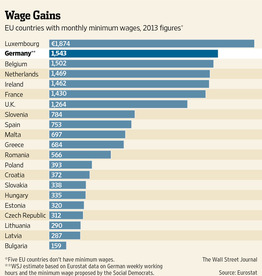Germany's SPD: Coalition Talks Amidst Youth Protests

Table of Contents
The Coalition Talks: A Balancing Act for Germany's SPD
Germany's political landscape post-election is a complex tapestry woven with the threads of multiple parties. The SPD, after emerging as the largest party but falling short of a majority, is currently engaged in intense negotiations to form a coalition government. Key partners in these talks include the Greens and the Free Democratic Party (FDP). These negotiations, however, are far from straightforward.
Significant policy disagreements pose substantial challenges to the SPD's ability to reach a consensus. The key sticking points revolve around three crucial areas:
-
Climate Change: The Greens are pushing for ambitious and rapid decarbonization, including a swift phase-out of coal power. The FDP, on the other hand, advocates for a more gradual transition, prioritizing economic growth and potentially favoring nuclear energy as a bridge solution. The SPD must find a compromise that satisfies both partners.
-
Economic Policy: Differing views on taxation, social welfare spending, and economic regulation create further friction. The FDP favors lower taxes and deregulation, while the Greens and SPD lean towards more social spending and environmental regulations. Finding a fiscally responsible yet socially just solution is a significant hurdle.
-
Social Justice: The SPD, with its traditional focus on social justice, must reconcile its commitment to strengthening social safety nets with the potentially fiscally conservative policies favored by the FDP. This balancing act requires navigating complex trade-offs and finding common ground on issues such as minimum wage, affordable housing, and healthcare.
The timeline for coalition formation remains uncertain, adding to the pressure on the SPD to achieve a successful outcome. Any delays could lead to political instability and further fuel public discontent. Potential compromises might involve phased implementation of climate policies, targeted tax reforms, and innovative social welfare programs that balance fiscal responsibility with social justice goals.
Youth Protests: Fueling Pressure on Germany's SPD's Climate Agenda
Germany has witnessed a surge in youth-led climate protests, primarily driven by the Fridays for Future movement. These protests, characterized by their scale, organization, and unwavering commitment, exert significant pressure on the SPD to adopt a more ambitious climate agenda.
The youth activists' demands are clear and uncompromising:
-
Phased Coal Power Plant Closure: Immediate and accelerated closure of coal-fired power plants is a central demand, alongside a rapid transition to renewable energy sources.
-
Massive Investment in Renewable Energy: Youth protestors demand substantial public investment in renewable energy infrastructure, including solar, wind, and geothermal energy.
-
Climate-Friendly Transportation Policy: A significant shift towards public transportation, cycling infrastructure, and electric vehicles is also a key demand, aiming to reduce carbon emissions from the transport sector.
The impact of these protests is substantial:
-
Public Opinion Shift: Youth activism has significantly raised public awareness of climate change, pushing the issue higher on the political agenda.
-
SPD Poll Ratings: While the SPD broadly supports climate action, some of their more moderate policies have drawn criticism from youth activists, potentially impacting their poll ratings.
-
SPD Response: The SPD has responded to the protests with commitments to strengthen climate action, but the extent of their commitment and the speed of implementation remain crucial factors in their credibility. The challenge lies in translating these commitments into concrete and timely policies.
Potential policy shifts in response to the protests could include more ambitious emission reduction targets, accelerated investment in renewable energy, and potentially even the review of the timeline for coal phase-out.
The Impact on SPD's Public Image and Future Strategies
The ongoing coalition talks and the intensity of youth climate protests are shaping public perception of Germany's SPD. This presents both opportunities and risks for the party's political standing and future electoral prospects.
-
Potential Gains and Losses in Public Support: A successful coalition agreement that includes ambitious climate policies could attract young voters and boost the SPD's image as a forward-thinking party. Conversely, failure to meet expectations on climate action or reaching a compromise deemed insufficiently ambitious could lead to a decline in support.
-
Impact on the SPD's Brand Image: The SPD's ability to effectively address both the demands of coalition partners and youth activists will be crucial in defining its brand image. The party needs to demonstrate it can be both pragmatic and visionary.
-
Long-Term Implications for Party Strategy: The outcome of these negotiations will have long-term implications for the SPD's political strategies. It will need to reassess its relationship with young voters and adapt its policies to address the urgent concerns regarding climate change.
The SPD faces a substantial strategic challenge in balancing the diverse interests of coalition partners, established industries, and the increasingly vocal youth climate movement. Finding solutions that address these concerns requires skillful negotiation and a long-term vision that incorporates both economic sustainability and environmental responsibility. The ability to effectively communicate these solutions to the public will be crucial to maintaining and enhancing the SPD's position.
Conclusion
This article has explored the multifaceted challenges confronting Germany's SPD. Navigating complex coalition talks while simultaneously responding to the powerful wave of youth-led climate protests represents a crucial test for the party's future. The balancing act between fulfilling coalition agreements and addressing urgent demands for climate action will significantly impact Germany's political trajectory and its commitment to tackling the climate crisis. The outcome will determine not only the composition of the next government but also Germany's ability to meet its climate goals and secure its position as a leader in global climate action.
Call to Action: Stay informed about the ongoing developments concerning Germany's SPD and their crucial role in shaping Germany's future. Follow our updates for further insights into the coalition negotiations and the evolving dynamics between the SPD and the youth climate movement. Learn more about Germany's SPD and their response to the climate crisis.

Featured Posts
-
 Schneider Electric Microgrid Empowers Domaine Carneros
Apr 30, 2025
Schneider Electric Microgrid Empowers Domaine Carneros
Apr 30, 2025 -
 Hollywood Shutdown Double Strike Cripples Film And Television
Apr 30, 2025
Hollywood Shutdown Double Strike Cripples Film And Television
Apr 30, 2025 -
 Manitoba Museum Expanding Its Hudsons Bay Collection
Apr 30, 2025
Manitoba Museum Expanding Its Hudsons Bay Collection
Apr 30, 2025 -
 Tfasyl Jdydt Tkshfha Shhadt Mylad Bywnsyh
Apr 30, 2025
Tfasyl Jdydt Tkshfha Shhadt Mylad Bywnsyh
Apr 30, 2025 -
 Churchill Downs And Emergency Services Prepare For Potential Storms During Kentucky Derby Week
Apr 30, 2025
Churchill Downs And Emergency Services Prepare For Potential Storms During Kentucky Derby Week
Apr 30, 2025
